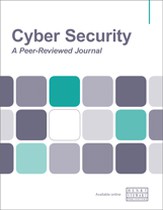Strategic trends in the global cyber conflict
Abstract
The paper reviews the main strategic trends in cyber policy and security in recent years, pointing out the emergence of a new ‘cyber escalation cycle’: while states are investing significant resources to improve their offensive cyber capabilities, these capabilities are subsequently being stolen, publicised and used by hostile countries to launch devastating cyberattacks. This has led governments to pursue legislation to control incoming technology, changing the technological relations between countries. Given the development of enhanced cyber capabilities and the effectiveness of the attacks, we believe that leakage followed by immediate use of the leaked offensive cyber weapons against rival countries will only increase, making this issue even more contentious.
The full article is available to subscribers to the journal.
Author's Biography
Gil Baram is Head of Research at the Yuval Nee’man Workshop for Science, Technology and Security and a research fellow at the Blavatnik ICRC, Tel Aviv University. Gil is also a PhD candidate in the Tel Aviv University School of Politics and International Relations, specialising in cyber conflict and national security. Currently Gil is an adjunct fellow at the Centre of Excellence for National Security, Nanyang Technological University, Singapore. Gil holds an MA in security studies from Tel Aviv University (magna cum laude). Gil’s previous work has been published in journals such as the Middle East Quarterly, Foreign Affairs, Military and Strategic Affairs, Maa’rachot, Acta Astronautica and Astropolitics.
Daniel Cohen is a senior researcher at Blavatnik Interdisciplinary Cyber Research Center (ICRC) and Yuval Ne’eman Workshop for Science, Technology and Security, Tel Aviv University. He is also head of the Strategy and Intelligence programme at the Abba Eban Institute for International Diplomacy, IDC Herzliya and serves as a consultant/expert on violent extremism and radicalisation for the Organization for Security and Co-operation in Europe (OSCE). Daniel’s research fields include cyber security, cyberterrorism, influence operations, terrorist organisations and their use of web and social media, and strategic offensive capabilities of actors in cyberspace. He is a frequent lecturer in the private sector, governments and security establishments, including as an expert representative at the UN Security Council Counter-Terrorism Committee. Daniel holds an MA in security studies from Tel Aviv University and a BA in government and strategy (cum laude) from the Interdisciplinary Center Herzilya. Prior to joining the ICRC, he served as a research fellow and coordinator of the cyber security programme at the Institute for National Security Studies (INSS) and worked as a consultant in the public sector.
Zeev Shapira is a researcher in security and international relations, focusing on space and cyber security. Zeev holds a BA in international relations and East Asian studies from the Hebrew University in Jerusalem and an MA in security studies from Tel Aviv University.
Omree Wechsler is the Head of Cyber Policy Research at the Yuval Ne’eman Workshop for Science, Technology and Security and at the Blavatnik Interdisciplinary Cyber Research Center, Tel Aviv University. Omree graduated with honours, a double major BA in political science and Middle Eastern studies from Tel Aviv University and an MA in the interdisciplinary European studies programme at Heinrich Heine University of Düsseldorf, Germany. Omree has also participated in the executive training programme for diplomats at the Diplomatic Academy in Vienna and served in the military intelligence branch of the Israel Defense Forces.
Nir Hight is a researcher at the Yuval Nee’man Workshop for Science, Technology and Security. Nir holds an MA in security studies from Tel Aviv University. Nir’s thesis focused on media distortions in asymmetric conflicts. His current research agenda focuses on space policy and strategy as well as cyber warfare. Previously, he was in charge of advancing aviation and space studies for the Israeli Educational System in the Fisher Institute for Space/Air Studies. Nir also holds a BA (cum laude) in political science, international affairs and communications from the Israel Open University.
Isaac Ben-Israel graduated from Tel Aviv University with a degree in mathematics, physics and philosophy, earning his PhD in 1988. A retired major-general in the Israel Air Force, Isaac has served as head of military R&D of the Israel Defense Forces and the Ministry of Defense. He is a recipient of the Israel Defense Award and the Israel Air Force Award. Isaac is currently head of the Blavatnik Interdisciplinary Cyber Research Center and head of the Yuval Ne’eman Workshop for Science, Technology and Security at Tel Aviv University. He is the chairman of the Israeli Space Agency at the Ministry of Science, Technology and Space. Isaac was the chairman of Israel National R&D Council in 2010–16 and was a member of Knesset from 2007 to 2009. In 2011 he was appointed by the Prime Minister to lead a task force that formulated Israel national cyber policy. Following that, he founded the National Cyber Bureau in the PM office. In 2014, he was appointed again by the PM to lead another task force, which resulted in a government decision (February 2015) to set up a new National Cybersecurity Authority. Isaac has written numerous papers on military and security issues.
